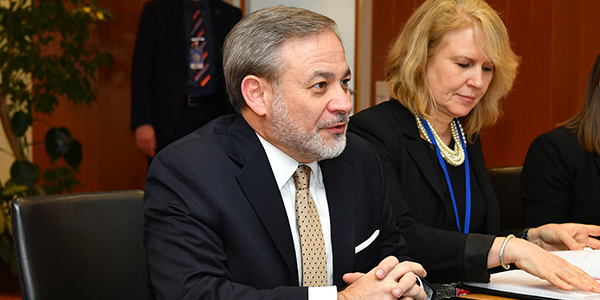The Department of Energy on Thursday issued a prohibition order barring some U.S. utilities from acquiring equipment from China, citing concerns that the Chinese government “is equipped and actively planning to undermine the [bulk power system].”
Affected by the order are utilities that supply critical defense facilities (CDFs), defined by Congress as facilities that are “critical to the defense of the United States” and “vulnerable to a disruption of the supply of electric energy” from external providers. Entities that meet this definition will be forbidden from “acquiring, importing, transferring or installing” the following equipment manufactured or supplied by entities “owned by, controlled by, or subject to the jurisdiction or direction of … China”:
- power transformers with low-side voltage of 69 kV or higher, along with associated control and protection systems;
- generator step-up transformers with high-side voltage rating of 69 kV or higher and associated control and protection systems;
- circuit breakers operating at 69 kV or higher;
- reactive power equipment, including reactors and capacitors, of 69 kV or higher; and
- associated software and firmware installed in any equipment or used in the operation of the previous items.
The order will take effect Jan. 16. Entities affected will be notified no later than five business days after its issuance and will be required to certify with DOE by March 17 that they have not entered into a prohibited transaction and have internal monitoring processes to ensure future compliance. Certification must be performed every three years as long as the prohibition order is in effect.
In addition, the order requires affected entities to certify by Feb. 15 that they have “designated (or taken all action reasonably available … to cause the relevant regional entity to designate)” relevant CDFs as priority loads in system load shedding and restoration plans.
“This order is one of several steps this administration is taking to greatly diminish the ability of our foreign adversaries to target our critical electric infrastructure,” Energy Secretary Dan Brouillette said in a statement.
A media release from NERC called the order “an important next step to further protect defense critical electric infrastructure” and pledged to “continue to work with industry, DOE and other government partners … to protect grid security.”
Order Builds on Foreign Cyber Fears
The order is the latest in a series of actions by the government this year aimed at blocking foreign interference in the North American electric grid.
President Trump set the tone in May with executive order 13920, which declared a national emergency regarding foreign threats to the BPS and gave Brouillette authority to ban purchases of equipment that posed a risk to the grid from entities connected to “foreign adversaries.” (See Trump Declares BPS Supply Chain Emergency.) DOE invoked this authority in Thursday’s order.
Trump’s declaration did not specify which countries were in mind. In a subsequent request for information, DOE identified China, Russia, Iran, Cuba, North Korea and Venezuela as foreign adversaries subject to the order. (See NERC Issues Level 2 Supply Chain Alert.)
Cybersecurity experts have expressed concern that China’s national security laws allow the government to compel individuals and companies to assist the country’s intelligence services. In June, the Federal Communications Commission designated Chinese hardware manufacturers Huawei Technologies and ZTE as national security threats. Communication equipment made by the two companies is widespread not only in the North American BPS, but also those in countries around the world.
The focus on Chinese equipment has sparked concern among industry representatives about the difficulty of tracking down manufacturers of specific equipment in the event of wider prohibitions on systems or even subcomponents from blacklisted countries or manufacturers.
“It’s one thing for us to recognize and figure out who we bought from. … We probably have those records going back 10 years,” Mike Kormos, senior vice president of transmission and compliance at Exelon, said at the National Association of Regulatory Utility Commissioners’ Summer Policy Summit in July. (See Industry Seeks Clarity on Supply Chain Orders.) “But when you start talking about potential subcomponents of these systems … [we] might have bought a transformer from one vendor, [and] who that vendor was using for subcomponents in that is something we don’t have, quite frankly.”





